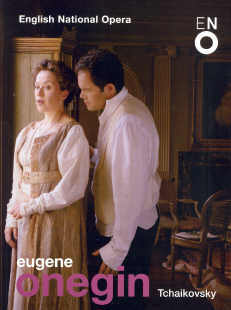

 |
 |
|

Eugene Onegin at ENO 14 June 2005 With ENO succumbing to the public demand for surtitles to make opera, even opera in English, more intelligible for paying audiences, a persistent and long sustained campaign for intelligibility in Seen&Heard and Musical Pointers (1992-1995) comes to a satisfactory conclusion. * The best, and most comprehensive, new discussion of the surtitles issue is Rupert Christiansen's in The Telegraph. He emphasises the complexity and cost of the technology and, importantly, the sensitivity demanded of those who write the scripts and the skill needed to time their appearances on screen properly. * But see also ENO at the Young Vic 2008 Eugene Onegin in Julia Hollander's production, revived at the Coliseum for the third time since its launch in 1994, may be the last there not to benefit from ENO's popular capitulation to surtitles. One of my very favourite operas, I didn't enjoy it much. The sets are artificial and unevocative, not helping the emotions to come through and take charge of our experience as they should. The large scale set pieces (party and ball) were efficiently contrasted, but the duel was sadly muffed. The women didn't get more than a few of their words across to our side-back stalls, some of the best seats for hearing at the dread Coliseum, but they should not be blamed unduly. It is often as much a question of vocal tessitura and the composer's orchestration, as of articulation. Tatania (Catrin Wyn-Davies) was under-characterised and The next chance to see Eugene Onegin in London, and with side-titles on a large screen box on the right hand side, will be on 21 July at Opera Holland Park, which has begun its 2005 season so auspiciously. Gerald Finley as Eugene Onegin. Photo: Tristram Kenton |